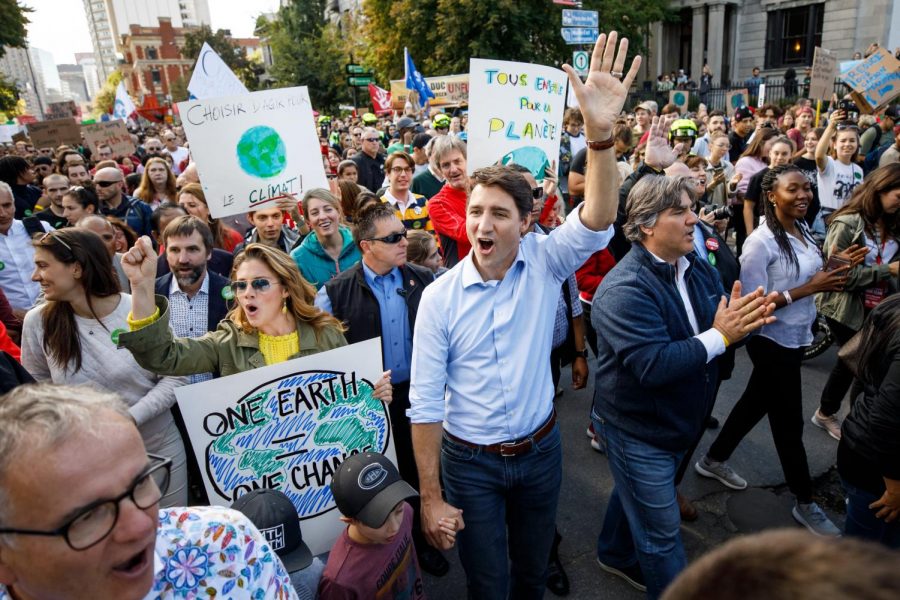Trudeau’s Past Disqualifies Him; So Do His Policy Decisions
Justin Trudeau has a reputation in America of being the world leader young people want to see: young, attractive and liberal.
Labeled the “Instagram Prime Minister” by the New York Times, Trudeau has gained this reputation through his “good looks” and seemingly charming persona.
There is no doubt that other people’s views of his policies and success are influenced by his appearance, so when photos recently emerged of him wearing blackface in 2001, the world paused to rethink their opinions. People are asking, how well do we even know this man, Prime Minister of our northern neighbor?
Trudeau promised environmental protection, yet he authorized the use of pipelines in Alberta, Canada. He promised to create a country that made equality its most important mission, yet he felt entitled to do blackface in the past. And, maybe most suspicious of all of his broken promises and conflicts, he threatened former attorney general Jody Wilson-Raybould when she attempted to testify against a major corporation.
It is safe to say Justin Trudeau has upset not only Canadians but also all Americans who worshiped him for his liberal ideas and promises for an equal country.
By 2001, it was well-established that one could not participate in racist acts such as these and escape without punishment. Excuses society often gives a person of power when they make a mistake, such as “it was common or okay at the time” or “he was young and immature but has grown since then” are not applicable in this case. Not only was it 2001, but he was also 29 at the time. Someone of that age cannot be pardoned for faulting so severely.
No matter his current beliefs, the entitlement Trudeau felt to engage in such a degrading act proves he is not who his supporters or his campaign portrayed him to be. There is never a reasonable time to do blackface (as everyone should know) and if Trudeau felt okay to do it for a Halloween costume, what does that show about his respect for people of color?
It’s simple: no matter how much he can change, Trudeau must face the repercussions of his racist actions.
Although these events do not necessarily mean Trudeau is racist at his core, it does raise questions about his ability to run a country rooted in equality.
Before the scandal — even despite some of his unfulfilled promises — Trudeau was paving the way for a cleaner environment and a more respectful and diverse society. Compared to America, these are revolutionary steps. However, the trust Trudeau was trying to establish with his voters is quickly crumbling.
The discovery of his past came as a surprise to many Americans, who — with Donald Trump as president — are yearning for a leader who does not engage in corrupt or wrongful activities.
Even in everyday life, it is disappointing when someone does not live up to expectations. In this case, the disappointment shines a light on two ideas.
First, there will never be a politician as pure as people desire he or she to be. To cope with our complex reality, it is imperative to remember the humanity of our world leaders. Often times, politicians are placed on a pedestal because they are the ones creating direct change, yet they work for the people. It is time for people to break the notion that politicians are somehow above everyday individuals. In the case of both Trudeau and Trump, we have excused their inexcusable mistakes long enough.
Second, this disappointment highlights the responsibility of voters to familiarize themselves with a candidate’s policies before casting a vote for or admiring a candidate.
Quite frankly, a candidate’s outward appearance and persona do not determine his or her ability to run a nation. It’s an age-old ideal, yet individuals are still prioritizing looks or charm over policy.
We must vote for people who have plans, determination and grit; this way, our nation will be led by a capable leader, rather than someone who won the election because of eloquence or other surface-level factors.
Although not everyone has great access to reliable news sources, it is important for those that have that luxury to inform themselves of elections. In Canada and America alike, it is much too common for voters to cast a ballot for reasons besides policy.
As Trudeau said in an interview after the images were released, “actions speak louder than words,” so how can Canadians trust him as a leader who makes claims for equality? His intentions may be noble, but it is difficult to believe he can achieve the equality he speaks of if he felt entitled to do blackface as an adult.
Looks are fleeting. Policy matters.
Emma Lipkind, FCRH ’23, is an International Political Economy major from Holland, Pennsylvania.

Emma Lipkind is a sophomore at Fordham College at Rose Hill. She hopes to combine all of her interests by pursuing a major in international political economy...










































































































































































































